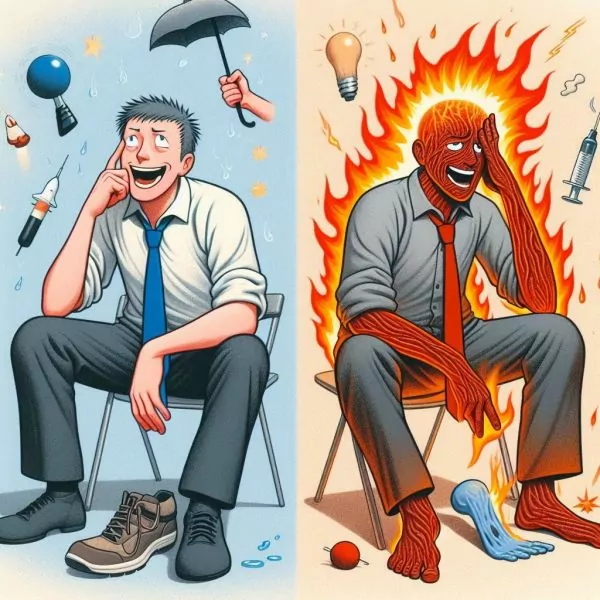
Did you know why do some people tolerate heat easily: while others feel unwell?
Some people cope well with heat, which does not always negatively affect their health. Meteorological factors have a greater impact on some individuals, while others are relatively indifferent to them. Doctors associate this with meteorological sensitivity.
What is meteorological sensitivity?
Meteorological sensitivity is a complex of reactions of the body to the influence of weather factors and sudden changes in climate.

There are three types of meteoropathy:
- Spastic. The body reacts to cooling, an increase in atmospheric pressure, and the oxygen content in the air.
- Hypoxic. Poor well-being as a reaction to warming and a decrease in oxygen concentration.
- Hypotensive. A person reacts to changes in pressure while the temperature remains stable.
This is why people who are less sensitive to weather changes cope with heat more easily.
Who and why is prone to hypoxic meteorosensitivity?
People with hypoxic meteoropathy find it difficult to endure heat. They usually suffer from impaired oxygen supply. Their medical history often includes vegetative-vascular dystonia and physiologically low blood pressure. This is why, in cool weather, when there is more oxygen in the air, they find it easier to breathe.

The at-risk group also includes:
- People with excess weight. In this condition, the body’s tissues are insufficiently supplied with oxygen.
- Elderly individuals. Young bodies adapt more easily to changes in the environment. As one ages, it becomes more difficult to adjust to heat.
- Endocrine patients. The actions of several hormones (from the hypothalamus, thyroid gland, and ovaries) are directly related to thermoregulation.
- Patients prone to thrombosis. The thicker the blood, the more effort the heart has to exert to pump it. In hot weather, blood viscosity significantly increases.
High temperatures are more easily tolerated in the absence of respiratory system pathologies. In summer, the air is dry, making it harder to breathe. This is why pulmonary disorders also make a person sensitive to weather changes.
What diseases increase weather sensitivity?
Neurological disorders are often the explanation for why a person feels unwell in the heat. Spinal diseases, nerve conduction disorders, and insufficient blood supply to the brain all enhance the reaction to high temperatures. Additionally, the following conditions can worsen the situation:
- Hyperthyroidism (overactivity of the thyroid gland). The body tolerates hot summers more easily when its internal temperature is within the normal range. However, with elevated levels of hormones T3 and T4, the temperature is higher.
- Fibromyalgia (chronic muscle pain). Patients have disrupted internal thermoregulation, leading to a pathological reaction to heat.
- Ovarian dysfunction (due to disease or menopause). In such cases, women suffer from hot flashes, and the intensity of symptoms increases in summer.

Chronic stress cannot be excluded either. In isolated cases, the body adapts well, but if stress is chronic, a person constantly lives with an accelerated heartbeat, elevated body temperature, and hyperhidrosis. This is why they feel worse in the heat.
Symptoms
Many people have a hard time coping with the heat, but it manifests differently in everyone. For some, it resembles a heat stroke, while for others, it feels like an exacerbation of a chronic illness.
Doctors identify several meteorotropic syndromes with a characteristic set of symptoms:
- Cardiac: pain behind the sternum, rapid heartbeat.
- Rheumatoid: muscle and joint pain, general weakness.
- Congestive: deterioration of health against the background of impaired blood circulation.
- Cerebral: emotional instability, insomnia, memory deterioration, increased fatigue.
How to alleviate the reaction to heat?

Regardless of a person’s health condition, they can cope better with heat by maintaining a proper hydration regimen. It is better to avoid sugary drinks. It is important to replenish the salts that the body loses through sweat. This is why mineral water is especially beneficial in high temperatures.
To survive the heat, the following can also help:
- Changing the diet. It is advisable to avoid heavy, fatty, and hot dishes.
- Regular showers. Sweating is one of the mechanisms for cooling the body. However, if sweat is not washed off, it can clog the pores, as it does not evaporate completely in the heat.
- Localized hydration. Not everyone has the opportunity to take a shower several times a day. However, dipping palms and wrists in water can be done as often as needed.
It is essential to prevent heatstroke. To do this, one should avoid direct sunlight. The most dangerous period is from 12 to 5 PM.
Why should you not cool the body suddenly?
A person feels better in a cool room; however, it is not advisable to turn the air conditioner to maximum right away. A sudden temperature change (more than 7 degrees) can also trigger meteoropathic reactions.

Regarding:
- contrast showers;
- ice cream;
- cold water;
- ice packs;
A home fan is an optimal means of cooling. It lowers the temperature of the surrounding air, not just affecting the body. However, it is better not to direct it directly at yourself.
Main tips during hot weather:
- Drink more water.
- Avoid physical exertion during the day. Any physical activities are better postponed to the evening or early morning, if possible.
- Ventilate the premises.
To suffer less from the heat, it is necessary to ventilate the premises every day. However, it is better to open windows early in the morning or late in the evening when the sun is not as intense.
- Water procedures:

Take a cool shower in the morning and evening. If taking a shower is not possible, you can wet a towel with water and wipe your body. If you are at home, you can periodically moisten your hair. Frequently immerse your hands in cold water (this will help cool your entire body).

It is advisable to wear loose-fitting clothing in light colors and made of natural fabrics. A head covering is mandatory when outdoors.